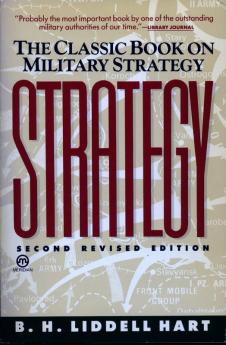This Book is Out of Stock!
English
Paperback
₹1699
(All inclusive*)
Delivery Options
*COD & Shipping Charges may apply on certain items.
Review final details at checkout.
Looking to place a bulk order? SUBMIT DETAILS
About The Book
Description
Author
<b>The most important book by one of the outstanding military authorities of our time.--<i>Library Journal</i></b> <p/><b><i>Strategy </i>is a seminal work of military history and theory and a perfect companion to Sun-tzu's <i>The Art of War</i> and Carl von Clauswitz's <i>On War.</i></b> <p/>This is the classic book on war as we know it. During his long life Basil H. Liddell Hart was considered one of the world's foremost military thinkers. In his writing he stressed movement flexibility and surprise. He saw that in most military campaigns it was vital to take an indirect approach. Rather than attacking the enemy head-on one must dislocate their psychological and physical balance. With key examples from World War I and World War II (think trench warfare vs Blitzkreig) Liddell Hart defines the practical principles of waging war--Adjust your end to your means Take a line of operation which offers alternate objectives--and proves they are as fundamental in the worlds of politics and business as they are in warfare.
*COD & Shipping Charges may apply on certain items.
Review final details at checkout.
₹1699
Out Of Stock
All inclusive*
Details
ISBN 13
9780452010710
Publication Date
-30-03-1991
Pages
-448
Weight
-376 grams
Dimensions
-134x202x26.81 mm








